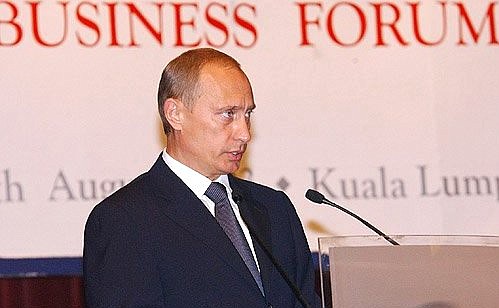
Mr Putin said that Russia ranked second after Japan in the Malaysian market for the growth rate of bilateral trade. Electronics, timber products and various consumer goods led Malaysian exports to Russia.
He expected the signing of a contract for the supply of Russian Su-30MKM aircraft to Malaysia to usher in exports of other Russian aviation technologies. Mr Putin stressed the sizeable experience of bilateral space partnership—in particular, a Russian rocket orbiting the Malaysian research satellite TiungSat-1. The President said such promising cooperation deserved to be continued—for instance, in remote sensing projects and in launching a Malaysian communication satellite.
Mr Putin also mentioned visa relations. He said that terrorism-related problems should not hamper business contacts. Though many countries were making their visa regulations more cumbersome, there was a much more preferable way—improve the work of law enforcement agencies and special services.
In connection with this, he called to encourage the travel of several categories of people from many countries, especially the citizens of countries whose relations were developing as positively as Russian-Malaysian. The President said that businessmen, politicians and students should enjoy more travel preferences.
Participants in the forum exchanged corporate contracts that were signed before. Thus, Rosoboronexport and Airot signed a contract for Mi-171 helicopters to be exported to Malaysia. Irkut Corporation reached an agreement to establish a Malaysian centre for the promotion of Russian multi-role amphibian aircraft Be-200 in the Asian-Pacific market, and signed a contract with Tapura Group on partnership principles for avionic R&D and manufacture. The Russian Vnesheconombank and Bank Negara Malaysia signed an agreement for a $50 million credit to finance palm oil deliveries to Russia.